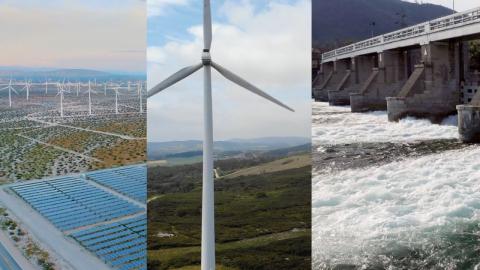Feature
Igniting the spark of a clean energy revolution

Transforming the way our world produces energy will be critical to tackling both the climate crisis and the energy access crisis. Now, 80 per cent of all greenhouse gas emissions stems from our energy production, making it one of the main drivers of climate change. And 760 million people live without electricity, while 2.6 billion cook with dirty, unhealthy fuels.
The UN High-level Dialogue on Energy, convened virtually on 24 September, is shaping up to be a historic and game-changing mobilization for action and cooperation on clean, affordable energy for all by 2030 -- Sustainable Development Goal 7 -- on the way to net-zero emissions by 2050.
A global roadmap to 2030 has been proposed. It suggests closing the energy access gap, shifting to decarbonized energy by quadrupling solar and wind capacity and phasing out coal plants by 2030 in richer countries, with others by 2040. The plan also calls for improving energy efficiency and tripling clean energy investment to 5 trillion dollars per year, as well as redirecting fossil fuel subsidies and putting a price on carbon. It also stresses the need for a just transition which can create tens of millions of green jobs and empower the most vulnerable.
Every country, city, financial institution, company and civil society organization has a role to play. All are being asked to submit “Energy Compact” commitments, outlining what actions they will take by 2030. Over 25 Energy Compacts have already been formed and more are being submitted for registration.
30 Governments also serve as Global Champions for the Dialogue and the private sector and philanthropy organizations are making strong commitments too. The IKEA Foundation and The Rockefeller Foundation have committed to launching a $1 billion fund to boost access to renewable energy in developing countries through mini-grids and off-grid sources. India’s largest power utility, the National Thermal Power Corporation (NTPC) Limited, announced an Energy Compact to nearly double their renewable energy capacity.
A coalition to mobilize Energy Compacts on green hydrogen technologies is being led by Denmark, Chile and Germany, in collaboration with IRENA, the World Economic Forum and others. Google, in partnership with Sustainable Energy for All, is mobilizing companies, governments and others to join a coalition for 24/7 carbon-free energy, recognizing that full decarbonization of electricity systems has the potential to eliminate nearly 50 per cent of greenhouse gas emissions globally.
A group spearheaded by Kenya, Malawi and the Netherlands is collaborating on a joint Energy Compact to boost access to clean cooking. Partners include UN DESA, Energia, the World Bank Group, WHO and the Health and Energy Platform of Action.
Stay tuned for lots of energy action this September, and onwards to 2030. Learn the latest here.
 Welcome to the United Nations
Welcome to the United Nations